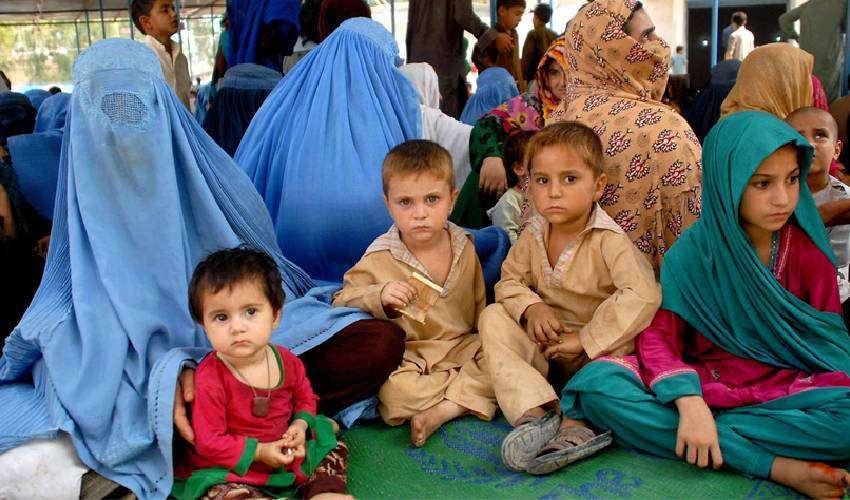Introduction
The intricate and prolonged challenge of repatriating Afghan refugees from Pakistan, currently evolving into a moral and humanitarian crisis, brings forth broader issues of identity, human rights, and international obligations.
Failed Repatriation Plan
The government’s attempt to repatriate Afghan refugees, despite earnest efforts, has ended in failure. With 160,000 individuals successfully repatriated, a staggering 1.7 million registered Afghans remain in the country. An unexpected turn sees the government declaring that those who returned will not be sent back, leaving them in a precarious situation, especially the destitute and marginalized.
Deportation Challenges: Fake Documents
A significant challenge in the deportation process revolves around the prevalence of fake identity cards and citizenship documents. Millions of Afghan refugees in Pakistan have acquired forged documents, undermining the repatriation process and raising questions about the overall integrity of the system.Read More, https://thebalochistanupdates.com/balochistan-afghan-refugee-demographic-challenge/

Regional Concerns and Border Control
Concerns about the repatriation plan extend beyond Pakistan, impacting neighboring countries. Saudi Arabia, for instance, reported the apprehension of 12,500 Afghans entering the country using Pakistani passports. Such incidents strain diplomatic relations and emphasize broader issues of border control and documentation fraud.
International Criticism and Violation of Norms
The government’s handling of the repatriation issue has garnered strong international criticism. The United Nations and various human rights organizations decry the actions as inhumane and a violation of international norms, casting a shadow on Pakistan’s role as a responsible neighbor and member of the global community.
Internal Reactions and Opposition
Within Pakistan, the repatriation plan has elicited mixed reactions. Pashtun political leaders, in particular, express strong opposition, highlighting the potential for unrest and instability in the region. These voices have compelled the government to reconsider its plan, acknowledging the complex web of domestic and international interests.
Contrasting Border Approaches
The joint western border, open to Afghans with a porous fence, promotes cross-border ties but comes at a significant cost to Pakistan due to unregulated trade and smuggling. In contrast, the Iranian border remains tightly sealed, causing frustration among Afghan refugees and highlighting the implications of these contrasting approaches.
Harsh Conditions for Afghan Refugees in Iran
The plight of Afghan refugees in Iran reveals harsh conditions, with limited access to basic rights, banned political activities, and the looming threat of severe punishment for minor infractions. The world’s silence on Iran’s treatment of Afghan refugees underscores a broader pattern of international inaction in the face of human rights abuses.
Global Silence on Human Rights Abuses
This situation aligns with a global pattern of silence concerning human rights abuses, exemplified by the plight of the Uighur population in Xinjiang, China. Despite China’s atrocities, the world remains largely silent, placing Pakistan in a delicate position given its deep ties with China.
The decline in Values and Moral Principles Over time, Pakistan has witnessed a decline in values, faith, and moral principles, evident in its treatment of Afghan refugees and muted response to international atrocities. The recent case of collecting goods for Gaza following Israel’s attacks raises commendable actions but sparks concerns about the geopolitical realities surrounding Gaza.
Challenges in Aid Collection for Gaza
Gaza’s global attention prompts international appeals for life-saving items, with welfare organizations and religious figures in Pakistan collecting supplies. However, growing concerns emerge that these goods may never reach Gaza, considering the dire circumstances in the region.
Broader Moral Quandary and Responsibilities
The failed repatriation plan underscores a broader moral quandary for Pakistan. Addressing identity, human rights, and international obligations comprehensively is imperative. The treatment of Afghan refugees in Iran, international silence on atrocities, and challenges in aiding Gaza emphasize the need for Pakistan to reevaluate its moral compass and role in the global community.
Balancing domestic interests with international responsibilities is crucial, reflecting a nation’s true character in its response to refugees and global crises.
FAQs:-
1. Why is the repatriation of Afghan refugees from Pakistan a complex and longstanding issue?
- The issue of Afghan refugees’ repatriation from Pakistan is complex and longstanding due to factors such as political instability in Afghanistan, ongoing conflicts, and the challenges of integrating a large refugee population.
2. What are the key reasons behind the failure of the recent repatriation plan, and how has it left a moral quandary for the nation?
- The failure of the recent repatriation plan can be attributed to the sheer magnitude of the refugee population, legal complexities, and the unforeseen hardships faced by returnees. The moral quandary arises from the government’s inability to fulfill promises and the precarious situation of those who have already returned.
3. How prevalent are fake identity cards and citizenship documents among Afghan refugees in Pakistan, and how do they impact the repatriation process?
- Fake identity cards and citizenship documents are widespread among Afghan refugees in Pakistan. This not only undermines the repatriation process by allowing individuals to stay in the country under false pretenses but also raises questions about the overall integrity of the documentation system.
4. What are the regional concerns associated with the repatriation plan, and how has it strained diplomatic relations, especially with Saudi Arabia?
- Regional concerns stem from the cross-border movement of Afghan refugees, leading to incidents like the apprehension of Afghans in Saudi Arabia using Pakistani passports. Such incidents strain diplomatic relations, highlighting the broader issue of border control and documentation fraud.
5. In what ways has the treatment of Afghan refugees in Iran become a pressing issue, and how does it reflect a broader pattern of international inaction in the face of human rights abuses?
- The harsh conditions faced by Afghan refugees in Iran, including limited access to basic rights and political restrictions, underscore a broader pattern of international inaction. Despite international laws advocating for the rights of individuals on both sides of the border, there has been consistent silence on Iran’s treatment of Afghan refugees.


